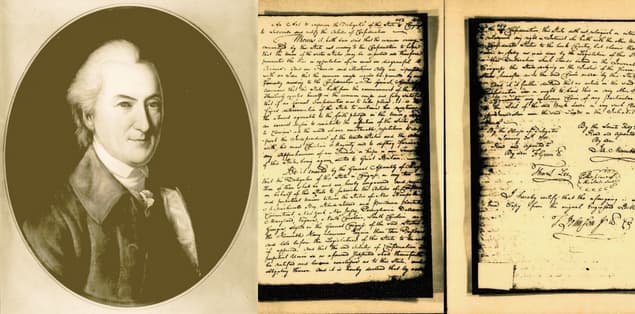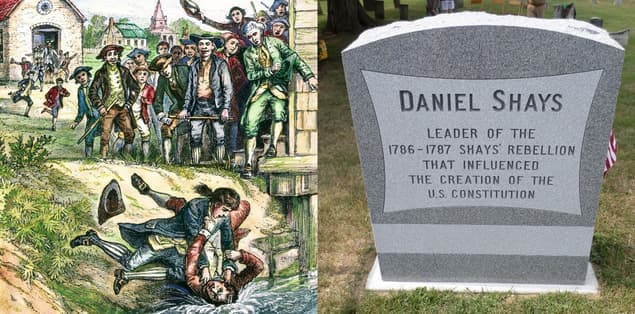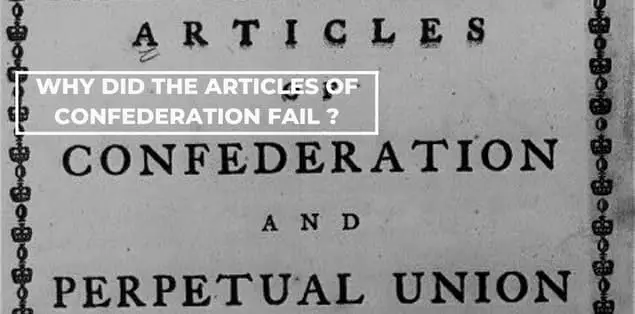So, why did the articles of confederation fail? The Constitution is viewed with utmost respect and regard in the United States. Regardless of their beliefs and alliance, politicians show reverence to the Constitution in every situation. It ranks second in importance to the Declaration Of Independence and is the guideline any governing body follows. However, the first governing document for this country is not the Constitution.
The official definition of the United States began in 1781 with the Articles of Confederation. Unfortunately, it was a period of ineffectiveness and instability that ultimately led to the failure of this governing document and the creation of a new Constitution. Hence, a new governing document emerged to address the multiple problems and combat the weak central government, and the Articles of Confederation failed. The question is, why did it fail? Let us find the answer to the same.
Background Of The Articles Of Confederation

The thirteen states that fought in the American revolutionary war were the backbone of the Articles of Confederation. This document provided a confederation congress structure for the nations aiming at creating a strong national government. After the adoption of a draft by John Dickinson in 1777, the ratification by the thirteen states took place in 1781.
The US Constitution replaced them in 1789, after eight years of ratification. The objective of creating this document was to create a confederation of state governments. The states, however, could retain their sovereignty and freedom. Every state had independence within the central government framework. The Americans were fiercely loyal to their nation and feared a strong central government.
Hence, the national government’s responsibility included matters of foreign affairs, armed forces, foreign treaties, coin money, etc. The government could even declare war on foreign nations, but it had no way to impose taxes or regulate trade. This purposeful weakening of the central government eventually led to several issues.
What Were The Main Articles of Confederation?
The Articles of Confederation had its share of weaknesses, but there were several achievements too. The US won the American revolution against the British and declared independence under this governmental document. The national government finally established several departments.
The Continental Congress improved relationships with foreign governments through the Treaty of Paris (1783) and another treaty with France (1778), although the latter was before the ratification of these articles. However, few issues in the document constituted the main Articles of Confederation. The primary concerns were-
- Each state counted for only one vote, irrespective of its size.
- The national government had no power to levy taxes and was also unable to collect taxes.
- Interstate commerce and foreign trade were out of the control of the Continental Congress.
- Congress lacked an executive branch to enforce laws. A national court system acting as the government’s judicial branch was also required.
- A unanimous vote was mandatory for any amendment to the Articles of Confederation.
- States could regulate commerce and tax the goods from other states. Thus, people considered that too much power was in the hands of the states.
- To pass laws, Congress would require a 9/13th majority.
When Did The Articles Of Confederation Fail?
The new United States did not provide adequate money to the government, and this document created a power struggle among the states. Some even started to take help from other countries and maintain a standing army called the state militia.
According to the Articles of Confederation, the states could print their own money, creating an absence of a national currency. It led to severe economic disintegration, and foreign powers wanted to take advantage of such a situation. The ultimate blow came to the Articles of Confederation when Shay’s rebellion occurred. The government was ineffective and could not extinguish Shay’s revolution as the new nation had no appropriate military systems.
This period is when the central powers realized that the Articles of Confederation failed to establish national governance that could help the nation sustain itself. Moreover, the revolutionary war had weakened the government, and the lack of an appropriate judicial branch further deteriorated the matters. Hence, the Articles of ConfederationConfederation failed.
Why Did the Articles of Confederation Fail Ultimately?
Economic Problems
The ConfederationConfederation failed due to several economic disorganization measures. The Continental Congress witnessed severe financial hardships, and the economic limitations in the Articles of Confederation made it more troublesome. A letter to Thomas Jefferson from James Madison had a detailed discussion of the economic disorganization resulting from the competitiveness among the states.
The government was unable to regulate commerce with other countries. The only power it had was regulating business with Native American tribes. The lack of economic coordination among the states also interfered with the foreign treaties as they did not allow imports or exports. The lack of a single national currency further deteriorated the matters, and there was no federal budget, substantial revenue, funds for other government tasks, etc.
Lack Of Potent Centralized Leadership
The new nation created under the Articles of Confederation lacked a substantial central power, leading to further disintegration. The judiciary was under state control, and there was no way the government could enforce its laws. The states could easily ignore national laws as there was no retribution or punishment. There was also no way to file a complaint against the federal government, and a citizen could not express their grievance to the government.
The government also lacked a chief executive to deal with their foreign affairs. The absence of a representative like a President generated several complaints from Great Britain. They regarded whom to contact for issues related to international diplomatic relations. There was also no standing army, and the government depended on the state military system. These limitations render it ineffective against internal and external threats.
Inefficient Legislations
Legislation involving a single vote for each state regardless of proportionality was inefficient. Passing laws was also troublesome as achieving the required majority was a near-impossible job. A tiny percentage of the population could help in improving the legislative process. Difficulty in amendments, lack of coordination among the states, and absence of actual power in the hands of the government eventually pointed out the ineffectiveness of the Articles of Confederation.
How Responsible Was The Shays’ Rebellion For The Failure Of The Articles?

Shay’s rebellion was a direct consequence of the incapability of the government. It was an internal threat that the government could not put down due to the absence of a national army. The economic depression and harsh policies outraged the civilians resulting in several rebels and uprisings. In 1786, a protest against the economic chaos took place in Western Massachusetts. The farmers of the region rose in rebellion due to outrage against the national government’s inability to create a stable economy and efforts to collect taxes.
While the initial protests were peaceful, they soon became more militant when multiple rebellion leaders were arrested. In addition, the people resisted tax collection and other harsh economic decisions imposed on them. Consequently, the government had to take funds privately from wealthy merchants of Massachusetts to deal with the uprising.
A Constitutional Convention took place in Philadelphia, where the delegates decided to change the articles and bring more effective policies in place of them. This meeting was the beginning of the end of the Articles of Confederation.
Final Words
Even though the Articles of Confederation failed, they were the building blocks of the present American Constitution. It united the colonies and created the foundation over which the new nation exists. However, the founding fathers wanted a stronger national government to control other countries and avoid a civil war.
Hence, they decided to replace the Articles of Confederation with a new set of legislations to create a more stable national government structure.
